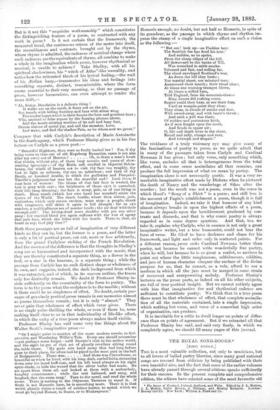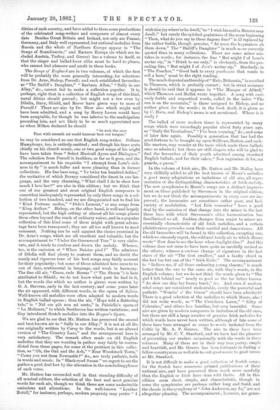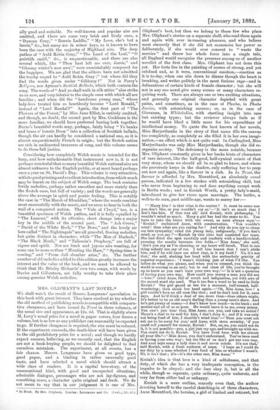THE ROYAL SONGBOOKS.*
[FIRST NOTICE.]
Tins is a most valuable collection, not only to musicians, but to all lovers of ballad poetry likewise, since many good national songs are rescued from oblivion by being published with their own beautiful airs, and the fact that some of the earlier volumes have already passed through several editions speaks sufficiently for their success. In the present complete and comprehensive edition, the editors have selected some of the most favourite old
The Songs of England, Ireland, Scotland, and Wales. Edited by S. L. Hatton. J. L. Molloy, Colin Brown, J. Pittman, and Brinley Richards. Landon: Boosey and Co. New York William A. Pond and Co.
ditties of each country, and have added to them some productions of the celebrated song-writers and composers of almost every date Besides Great Britain and Ireland, not only are France, Germany, and Italy well represented, but national melodies from Russia and the whole of Northern Europe appear in "The Songs of Scandinavia;" and Eastern Europe (in which are in- cluded Austria, Turkey, and Greece) has a volume to itself, so that the singer and ballad-lover alike must be hard to please, who cannot find pleasure and profit in these books.
The Songs of England are in two volumes, of which the first will be probably the more generally interesting, for selections from Dr. Arne, Bishop, Purcell ; and such established favourites as "The Bailiff's Daughter," "Barbara Allen," "Sally in our Alley," Stc., cannot fail to make a collection popular. It is, perhaps, right that in a collection of English songs of this kind, naval ditties should prevail ; but might not a few even by Dibdin, Davy, Shield, and Reeve have given way to more of Purcell P There are airs by Dr. Blow also which might well have been admitted, and a song by Henry Lewes would have been acceptable, for though he was inferior to the madrigalists preceding him, and not likely to be as much appreciated now as when Milton declared he should "be writ the man
That with smooth air could humour best our tongue,"
he may be considered as our first English song-writer. Pelham Humphreys, too, is entirely omitted ; and though his fame rests chiefly on his church music, one or two good songs of his might have been taken from" Select Musicall Ayres and Dialogues." The selection from Purcell is faultless, as far as it goes, and the accompaniment to his exquisite "I attempt from Love's sick- ness to fly" is much fuller and more pleasing than in former collections. His fine bass song, "Ye twice ten hundred deities," the recitative of which Burney considered the finest in our lan- guage, and the very charming, "What shall I do to show how much I love her ?" are also in this edition ; but we think that one of our greatest and most original English composers is somewhat inadequately represented by only three songs in a col- lection of two hundred, and we are disappointed not to find his "Kind Fortune smiles," " Dido's Lament," or any songs from "King Arthur." Bishop, on the other hand, is well and largely represented, but the high setting of almost all his songs places them often beyond the reach of ordinary voices, and in a popular collection of this kind some of them might with great advan- tage have been transposed ; they are all too well known to need comment. Nothing can be said against the choice exercised in Dr. Arne's songs, which are all excellent and valuable, but the accompaniment to "Under the Greenwood Tree " is very elabo- rate, and it tends to confuse and drown the melody. Whence, too, is the omission of "When Daisies pied ?" The admirers of Dibdin will find plenty to content them, and no doubt the manly and vigorous tone of his best songs may fairly account for their popularity; but some of those admitted here seem to us out of date, sentimental in language, and weak in harmony. The fine old air, "Cease, rude Boreas " (" The Storm ") is here attributed to Shield ; we do not know what part he had in it, but the words (for which no author is given) were written by G. A. Stevens, early in the last century, and some years later the air appeared, with different words, in the opera of Sylvia. Well-known old melodies were often adapted to modern words in English ballad operas ; thus the air, "Hope told a flattering tale," is " Nel cor pii non mi sento," in Paisiello's opera of "La Molinaro," to which Beethoven has written variations ; and Gay introduced Scotch melodies into the Beggar'e Opera.
We are glad to see that Mr. Hatton has preserved the second and best-known air to "Sally in our Alley ;" it is not at all the one originally written by Carey to the words, but is an altered version of "The Country Lass," and the arrangement here is very satisfactory. The remark often made on old English melodies that they are wanting in pathos may fairly be contra- dicted from these pages, for some of the prettiest in this collec- tion, as "Oh, the Oak and the Ash," "Near Woodstock Town," "Come you not from Newcastle ?" &c., are truly pathetic, both in words and music. In" Black-eyed Susan" we regret to see the pathos a good deal lost by the alteration in the concluding phrase of each verse.
Mr. Hatton has succeeded well in that standing difficulty of all musical editors, the selection of the best and most genuine words for each air, though we think there are some undesirable omissions and alterations. In the well-known "Leather Botta," for instance, perhaps, modern propriety may prefer" I wish him joy whereer he dwell," to " I wish his soul in Heaven may dwell ;" but surely the spirited quaintness of the verse beginning "Then, what do you say to these flagons fine?" is ill replaced by the rather feeble, though genuine, "At noon the haymakers sit them down." The "Bailiff's Daughter" is much more correctly quoted than in many collections. There are some minor mis- takes in words ; for instance, the line "But might I of Love's nectar sip," in "Drink to me only," is obviously, from the pre- ceding line, "But might I of Jore'e nectar sip." Similarly, in "The Poacher," "Good luck to every gentleman that wants to sell a hare," must be the right reading.
The much disputed authorship of" Rule, Britannia," is ascribed to Thomson, which is probably correct ; but in strict accuracy it should be said that it appears in "The Masque of Alfred," which Thomson and Mallet wrote together. A song with curi- ously feeble and unpoetical words, called in the index "The sun is on the mountain," is there assigned to Bishop, and no author given for the words ; in the book itself, it is given as by C. Horn, and Bishop's name is not mentioned. Whose is it really ?
The ballad of more modern times is represented by many songs which were exceedingly popular about forty years ago, as "Gaily the Troubadour," "I've been roaming," So., and some of later date again. Possibly a generation that has bad the good-fortune to be brought up upon Sullivan, Hatton, and such- like masters, may wonder at the taste which made these ballads once so admired ; but there are still singers who will be glad to find the favourites of their youth admitted among standar& English ballads, and for their sakes," Non ragioniam di lor, ma guarda, e passe."
In the volume of Irish airs, Mr. Hatton and Mr. Molloy have very skilfully added to all the best known of Moore's melodies a good many adaptations or imitations of old airs, all repre- sentative of the distinguishing characteristics of Irish melody. The new symphonies to Moore's songs are a distinct improve- ment on those published by Stevenson in the original edition, but we do not think the accompaniments in every case are im- proved; the harmonies are sometimes rather poor, and lack variety of modulation. "Let Erin remember" loses a good deal by the omission of that change into the minor in the last three bars with which Stevenson's older harmonisation has familiarised us all. Sudden changes from major to minor are essentially characteristic of old Irish melodies, and a certain plaintiveness pervades even their martial and dance-tunes. All the old favourites will be found in this collection, excepting one, which we sincerely regret, the wild and lovely air to which Moore wrote" How dear to me the hour when daylight dies !" And this volume does not seem to have been quite as carefully revised as the others ; witness a curious change of signature in the last stave of the air "The first swallow," and a faulty chord in the last bar but one of the "Irish Exile." The accompaniment to "Believe me, if all those endearing young charms," is much better than the one to the same air, with Gay's words, in the English volume ; but we do.not think the words given to "The girl I left behind me" nearly so good as the far better known "As slow our ship her foamy track," &c. And even if modern rebel songs are considered undesirable, surely the powerful and pathetic " Wearin' o' the Green" should hare been admitted ? There is a good selection of the melodies to which Moore, alas ! did not write words, as "The Cruiskeen Lawn," "Kitty of Coleraine," and others less familiar, but very beautiful. Some airs are given by modern composers in imitation of the old ones, but there are still a large number of genuine Irish melodies for which words have never been written, although of late some of these have been arranged as songs to words imitated from the Celtic by Mr. A. P. Graves. The airs to these have been arranged by Mr. C. V. Stanford, and we have had the pleasure of presenting our readers occasionally with the words in these columns. Many of them are in their way true poetry, simple and heartfelt, and Mr. Graves has been fortunate in finding a fellow-countryman so well able to suit good music to good verses as Mr. Stanford.
It is not difficult to make a good collection of Scotch songs,. for the Scotch have numerous printed publications of their-
national airs, and have preserved them much more carefully than the English or Irish have done with theirs. All in this edition seem short, simple, and characteristic, though in some the symphonies are perhaps rather long and florid, and the chords in the symphony of "John Anderson, my Jo," are not altogether pleasing. The accompaniments, however, are gener- ally good and suitable. No well-known and popular airs are omitted, and there are some very brisk and lively ones, a "Duncan Gray," "Bonnie Laddie," "My Love, she's but a lassie," &c., but many are in minor keys, as is known to have been the case with the majority of Highland airs. The deep pathos of "Auld Robin Gray," "The Land of the Leal," "0 pnirtith cauld," &c., is unquestionable, and there are also several which, like "Thou hest left me ever, Jamie," and "Gloomy winter's now awa'," were unmistakably composed for the bagpipes. We are glad that the editors have not admitted the trashy sequel to "Auld Robin Gray ;" but where did they find the words given under " Gilderoy ?" Not in Percy's Bongoes, nor Aytoun's Scottish Ballads, which both contain the song. The words of "And ye shall walk in silk attire "also strike us as new, and very inferior to the simple ones with which all are familiar ; and when did the "handsome young man," whose lady-love treated him so heartlessly become "Lord Ronald,' instead of "Lord Randal ?" Again, the first part of "The Flowers of the Forest," by Miss Jane Elliot, is entirely omitted, and though, no doubt, the second part by Mrs. Cockburn is the more familiar, we should have preferred having both together. Burns's beautiful words may, perhaps, fairly bring "Ye banks and braes o' bonnie Doon " into a collection of Scottish ballads, though the air can hardly be considered a national one, as it is almost unquestionably French in origin ; but the Scotch nation are rich in undisputed treasures of song, and this volume seems to do them full justice.
Considering how completely Welsh music is intended for the harp, and how unfashionable that instrument now is, it is not perhaps wonderful that so many beautiful Welsh national airs are almost unknown to the English public, or at most heard perhaps once a year on St. David's Day. This volume is very attractive, with its good printing and excellent introduction, from which much may be learnt on the subject of Welsh songs. The book contains lovely melodies, perhaps rather smoother and more stately than the Scotch ones, but full of variety ; and the words are generally above the average in spirit and poetic feeling. This is notably the case in "The Marsh of Rhuddlan," where the words combine most successfully with the music, and we seem to hear in both the wail of a conquered nation. The "Vale of Clwyd," too, is a beautiful specimen of Welsh pathos, and it is fully equalled by "The Lament," with its effective, short change into a major key in the middle of the second part. The "Ash Grove," "David of the White Rock," "The Dove," and the lovely air here called "The Nightingale" are all graceful, flowing melodies, but quite distinct in character; while "The Men of Harlech," "The Black Monk," and " Taliessin's Prophecy," are full of vigour and spirit. Nor are fresh and joyous airs wanting, for none can be more so than "Hunting the Hare," "Spring-time is coming," and "From dull slumber arise," &c. The further number of old melodies added to this edition greatly increases the interest and the value of the book, and we must be allowed to think that Mr. Brinley Richards' own two songs, with words by Davies and Gilbertson, are fully worthy to take their place among genuine Welsh melodies.:








































 Previous page
Previous page